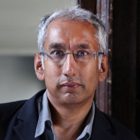Free Speech Bites: Natalia Kaliada on the arts in Belarus
Natalia Kaliada is co-founder of the Belarus Free Theatre. The group, formed in 2005, performs provocative political works in a country where it can be lethal to criticise the dictator Alexander Lukashenko. Natalia was forced into exile after the brutal crackdown on Belarus’s opposition after the rigged 2010 presidential elections. Here she speaks to Nigel Warburton about the difficulty of creating art in Europe’s last dictatorship
Enemies of free speech
 As four men go on trial in Denmark accused of planning an attack against newspaper Jyllands-Posten, Kenan Malik argues that since the Danish cartoon controversy free expression is now seen as an enemy of liberty
As four men go on trial in Denmark accused of planning an attack against newspaper Jyllands-Posten, Kenan Malik argues that since the Danish cartoon controversy free expression is now seen as an enemy of liberty
Why aren't we talking about protecting free speech online at WCIT?
Today is International Human Rights Day, so with the UN’s International Telecommunications Union (ITU) meeting in Dubai to reframe its guiding texts, adding a few lines reminding states of their human rights obligations should be both desirable and simple. Not quite.
The ITU’s 3-14 December World Conference on International Telecommunications (WCIT) is seeking to update its rules for the internet age and extend its writ over the web, but several states — the US chief among them — strongly oppose this.
They want even the mere mention of the internet kept out of the ITU’s International Telecommunication Regulations (ITRs) to make sure, in the words of US delegation chief they “stay pure to telecom”.
That meant that it was a no to Tunisia’s worthy attempt to have guarantees protecting freedom of expression online written into the ITRs, partly because the wording added a slash and “ICTs” to the phrase ‘telecommunications/ICTs”.
It also meant no to the use of the words “freedom of expression”, which the US and others fear will trigger an unresolvable wider discussion of content online among conference members already seeking new ways to legitimise online bans on Innocence of Muslims-type YouTube uploads.
In a game of treaty language whack-a-mole, words designed to blur the ITRs specifics to allow more state authority over the net pop up, are withdrawn, then pop up again elsewhere. One such set of clauses from Russia, dropped last week in the face of outrage from free speech minded states and civil society, reappeared later in an even worse new “compromise text” to be tabled today.
Sometimes vagueness is sought by dropping — not adding — words, such as a call to cut “recognised” from the treaty phrase “recognised operating agency”. That would extend the ITRs writ from a set list of firms to “any individual, company, corporation or governmental agency which operates a telecommunication installation” — theoretically, anyone with a home wi-fi network.
Despite all this, a number of states still want human rights language in the ITRs somewhere, probably in the preamble, where the words would get the required respect, without the actual impact. All that would be added is the line: “While implementing these Regulations Member States shall take into account their international obligations in relation to universal human rights.”
Yet even this makes some states a touch nervous. “Definitions define exactly what is being covered,” commented one observer, harking back to the first big global summit on the internet — in Tunisia, in 2005. “Discussions around use of a certain word or combination of words can be mind-numbingly dull. But wording from Tunis is still used seven years later to win an argument.”
Rohan Jayasekera is Associate Editor and Deputy Chief Executive of Index on Censorship
What can you do?
Index and many other civil society organisations that fight for free speech and internet freedom oppose moves to give the ITU authority over the internet. Join more than 33,000 other citizens from 166 nations and sign here to ask your nation’s leaders to protect global internet freedom
If you are an academic or work for a civil society organisation — join us by signing on here and send the letter to government officials who are participating in the ITU process
More on this story:
WCIT | Dominique Lazanski on The obscure threat to the internet you need to know about
WCIT | Milton Mueller on the internet revolution in crisis

